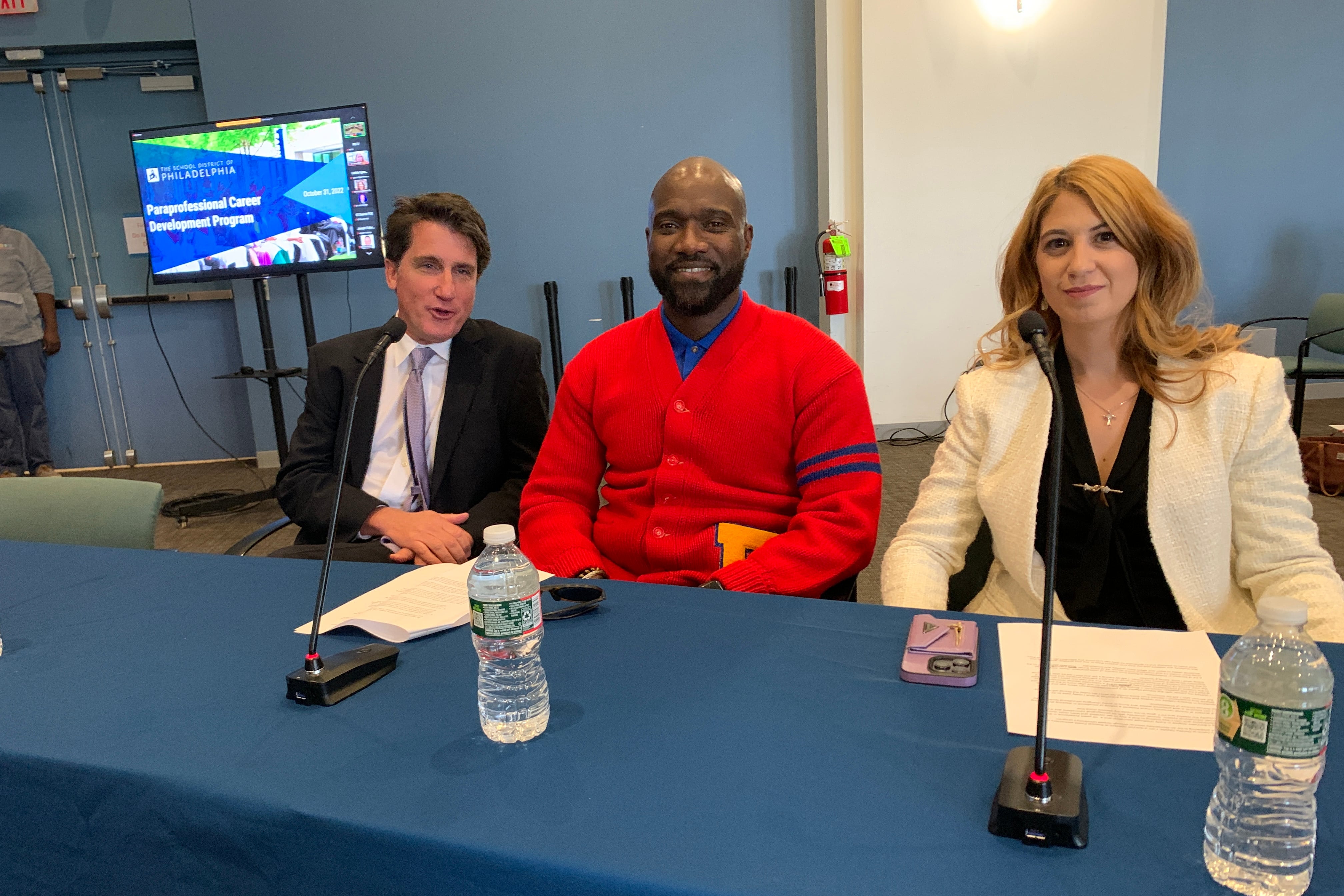A shortage of educators, especially those of color, is “the most urgent crisis facing our schools today,” said acting Pennsylvania Secretary of Education Eric Hagarty said at an event Monday in Philadelphia.
His comments came as the new state Committee on Educational Talent and Recruitment convened in Philadelphia to consider strategies for finding, training, and retaining more qualified teachers in the state.
As part of the effort, Superintendent Tony Watlington said at the meeting that the Philadelphia school district, which has already invested $2.5 million of federal American Rescue Plan funds to help district paraprofessional employees earn teaching credentials, will add $1.7 million more to the effort.
“We know that research tells us the single most important factor in student academic attainment is a highly-qualified, well-supported teacher force over time,” Watlington said.
The “grow your own” program, which is a collaboration between the district and the Philadelphia Federation of Teachers, has 84 paraprofessionals studying to become teachers, said Larissa Shambaugh, the district’s chief talent officer.
The additional $1.7 million will allow the district to train an additional 75 paraprofessionals to become teachers and pay them during their student teaching. Some paraprofessionals previously may have had to take unpaid leave to join the program, which might have deterred some from participating.
The program also covers tuition and other related costs so that participants can graduate debt-free.
For Philadelphia, finding enough teachers to fill all the positions continues to be a challenge: More than 200 teaching jobs are vacant, according to the district, which has about 9,000 teachers and more than 216 district-operated schools.
Philadelphia Federation of Teachers President Jerry Jordan said the goal is to have a teacher workforce in Pennsylvania in 2025 that is “healthy and robust, representative of the students we serve … and ensures access to leadership and professional growth opportunities.”
There are several different pathways for aspiring teachers in Philadelphia, depending on their level of education. Those with a bachelor’s degree but a grade point average under 3.0, for example, can take courses at LaSalle University. (State law requires aspiring teachers to maintain at least a 3.0 GPA in college to be eligible for certification.)
Those who have a 3.0 GPA or better, meanwhile, can study at Temple and Drexel universities. Those with only high school diplomas, GEDs or fewer than 60 college credits take courses through the nonprofit College Unbound.
Pool of potential teachers shrinks
The new state committee was established under legislation sponsored by Democratic state Sen. Vincent Hughes that was enacted in July and aims to expand and diversify the state’s teacher workforce.
The legislation created a career and technical education pathway in high school for aspiring teachers, and requires all districts to establish a dual-enrollment program with a local post-secondary institution.
It also makes it easier for people who are certified in another state to transfer their credentials to Pennsylvania, temporarily waives a basic skills test for aspiring teachers — although to be certified all candidates must still pass the Praxis exam — and requires better data collection by school districts and colleges that prepare teachers.
Hughes appeared briefly at the meeting and urged educators to “think big, do not have low aim,” when it comes to devising ways to attract more young people to teaching.
He noted that the issue of finding and training excellent teachers is even more crucial now since the pandemic has caused many students to fall further behind.
(Hughes has a particular interest in education and teaching. His wife Sheryl Lee Ralph plays the kindergarten teacher Barbara Howard on the hit show “Abbott Elementary,” which is about a fictional Philadelphia public school.)
Statewide statistics help explain the urgency from Hughes, Hagarty, and others.
A decade ago, 20,000 people graduated from state colleges with teaching degrees. This year, that number had dropped to just 6,000, said Tomas Hanna, the state education department’s chief talent officer.
In a July report, the state announced its strategy to build up its teacher workforce by 2025, which includes efforts to streamline preparation, increase diversity, and provide more access to high-quality “professional growth and leadership opportunities.”
The shortage of teachers in Pennsylvania spans rural, suburban, and urban schools, but is most pronounced in areas serving low-income students and students of color, the report said.
In addition, the state must not just find more teachers, but find more teachers of color, Hagarty said. Right now, 37% of students in Pennsylvania are nonwhite, but only 7% of teachers are, he said Monday.
“This is an urgent moral calling,” Hagarty said. “If we don’t focus on the diversity of the education workforce, we are not doing right by” the state’s students.
He added that it is not just students of color who benefit from a diverse pool of teachers. “We owe it to white students to ensure a variety of perspectives are heard,” Hagarty said.
Howard Griffith, a paraprofessional who specializes in conflict resolution at Frankford High School, said at Monday’s event that one thing he learned in his 20 years at the school is that students “need to see people who look like them in the classroom every day.”
He is now pursuing a bachelor’s degree in organizational leadership through College Unbound so he can become a teacher.
Dimitra Glyptis, who works at Samuel Powel Elementary School as a paraprofessional, is a teacher resident at Drexel. A native of Greece, she has a degree in early childhood education, and said that the program “made her dreams come true” by giving her the means and opportunity for her to become a teacher.
As a paraprofessional, she said, “I always felt I could do more for students and Philadelphia.”
Dale Mezzacappa is a senior writer for Chalkbeat Philadelphia, where she covers K-12 schools and early childhood education in Philadelphia. Contact Dale at dmezzacappa@chalkbeat.org






